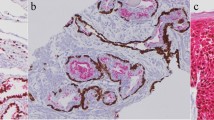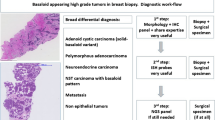Abstract
Background
Although conventional one-step nucleic acid amplification (OSNA) is a useful molecular-staging method, its complexity hinders its use in clinical practice. A pooled approach for OSNA (pOSNA) has been evaluated for its feasibility in pathologically node-negative colon cancer (pNNCC) for molecular staging of lymph node metastasis in clinical practice.
Methods
Subjects were patients diagnosed with clinical stage II–IIIA colon cancer between January 2017 and September 2018. pOSNA involved harvesting pericolic lymph nodes from fresh surgical specimens, cutting them in half, placing 50% of the nodes in a single test tube, and performing the OSNA assay. The remaining halved pericolic, intermediate, and main lymph nodes were submitted for histopathologic examination, with metastasis determined by hematoxylin and eosin staining of a cut surface of each node.
Results
Of the 98 enrolled patients, 92 formed the analysis set. The mean number of harvested lymph nodes per case was 24.3 (range 5–66) and the mean number of lymph nodes used for pOSNA analysis was 6.9 (range 1–35). The concordance rate, sensitivity, and specificity between methods were 89.1%, 84.6% (95% confidence interval [CI] 0.80–0.91), and 90.9% (95% CI 0.88–0.94), respectively. The pOSNA upstaging rate for node-negative patients was 9.1% (6/66), and pOSNA returned false-negative results in 15.4% of node-positive cases (4/26).
Conclusions
pOSNA demonstrated an upstaging rate for pNNCC equivalent to that in previous studies, suggesting its feasibility for molecular staging of pNNCC in clinical practice.


Similar content being viewed by others
References
Yamamoto H, Tomita N, Inomata M, et al. OSNA-assisted molecular staging in CRC: a prospective multicenter trial in Japan. Ann Surg Oncol. 2016;23:391–6.
Croner RS, Geppert CI, Bader FG, et al. Molecular staging of lymph node-negative colon carcinomas by one-step nucleic acid amplification (OSNA) results in upstaging of a quarter of patients in a prospective, European, multicentre study. Br J Cancer. 2014;110:2544–50.
Tsujimoto M, Nakabayashi K, Yoshidome K, et al. One-step nucleic acid amplification for intraoperative detection of lymph node metastasis in breast cancer patients. Clin Cancer Res. 2007;13:4807–16.
Kumagai K, Yamamoto N, Miyashiro I, et al. Multicenter study evaluating the clinical performance of the OSNA assay for the molecular detection of lymph node metastases in gastric cancer patients. Gastric Cancer. 2014;17:273–80.
Kosťun J, Pešta M, Sláma J, et al. One-step nucleic acid amplification vs ultrastaging in the detection of sentinel lymph node metastasis in endometrial cancer patients. J Surg Oncol. 2019;119:361–9.
Bilchik AJ, Hoon DS, Saha S, et al. Prognostic impact of micrometastases in colon cancer: interim results of a prospective multicenter trial. Ann Surg. 2007;246:568–75.
Sloothaak DAM, van der Linden RLA, van de Velde CJH, et al. Prognostic implications of occult nodal tumour cells in stage I and II colon cancer: the correlation between micrometastasis and disease recurrence. Eur J Surg Oncol. 2017;43:1456–62.
Park SJ, Lee KY, Kim SY. Clinical significance of lymph node micrometastasis in stage I and II colon cancer. Cancer Res Treat. 2008;40:75–80.
Yamamoto H, Sekimoto M, Oya M, et al. OSNA-based novel molecular testing for lymph node metastases in CRC patients: results from a multicenter clinical performance study in Japan. Ann Surg Oncol. 2011;18:1891–8.
Tiernan JP, Verghese ET, Nair A, et al. Systematic review and meta-analysis of cytokeratin 19-based one-step nucleic acid amplification versus histopathology for sentinel lymph node assessment in breast cancer. Br J Surg. 2014;101:298–306.
Itabashi M, Yamamoto H, Tomita N, et al. Lymph node positivity in one-step nucleic acid amplification is a prognostic factor for postoperative cancer recurrence in patients with stage II CRC: a prospective, multicenter study. Ann Surg Oncol. 2020;27:1077–83.
Vogelaar FJ, Reimers MS, van der Linden RL, et al. The diagnostic value of one-step nucleic acid amplification (OSNA) for sentinel lymph nodes in colon cancer patients. Ann Surg Oncol. 2014;21:3924–30.
Croner RS, Schellerer V, Demund H, et al. One step nucleic acid amplification (OSNA)–a new method for lymph node staging in colorectal carcinomas. J Transl Med. 2010;8:83.
Güller U, Zettl A, Worni M, et al. Molecular investigation of lymph nodes in colon cancer patients using one-step nucleic acid amplification (OSNA): a new road to better staging. Cancer. 2012;118:6039–45.
Rakislova N, Montironi C, Aldecoa I, et al. Lymph node pooling: a feasible and efficient method of lymph node molecular staging in colorectal carcinoma. J Transl Med. 2017;15:14. https://doi.org/10.1186/s12967-016-1114-3.
Yamaoka Y, Kinugasa Y, Shiomi A, et al. The distribution of lymph node metastases and their size in colon cancer. Langenbecks Arch Surg. 2017;402:1213–21.
Brown G, Richards CJ, Bourne MW, et al. Morphologic predictors of lymph node status in rectal cancer with use of high-spatial-resolution MR imaging with histopathologic comparison. Radiology. 2003;227:371–7.
Yamamoto H, Murata K, Fukunaga M, et al. Micrometastasis volume in lymph nodes determines disease recurrence rate of stage II colorectal cancer: a prospective multicenter trial. Clin Cancer Res. 2016;22:3201–8.
Japanese Society for Cancer of the Colon and Rectum. Japanese classification of colorectal, appendiceal, and anal carcinoma: the 3d English edition [secondary publication]. J Anus Rectum Colon. 2019;3: 175-195.
Shimazu K, Tanei T, Tamaki Y, et al. Performance of a new system using a one-step nucleic acid amplification assay for detecting lymph node metastases in breast cancer. Med Oncol. 2019;36:54.
Horimoto Y, Tanabe M, Kazuno S, et al. Elucidation of inhibitory effects on metastatic sentinel lymph nodes of breast cancer during one-step nucleic acid amplification. Sci Rep. 2018;8:7563.
Labianca R, Nordlinger B, Beretta GD, et al. Early colon cancer: ESMO Clinical Practice Guidelines for diagnosis, treatment and follow-up. Ann Oncol. 2013;24:64–72.
Acknowledgment
Editorial support based on the authors’ detailed directions in the form of medical writing, assembling tables, creating high-resolution images, collating author comments, copyediting, fact checking, and referencing was provided by Editage (Cactus Communications). Conduct of the research and preparation of the article was funded by Sysmex Corporation.
Author information
Authors and Affiliations
Corresponding author
Ethics declarations
Disclosures
This study was supported by Sysmex Corporation (Kobe, Japan). Naohiro Tomita, Taiho Pharmaceutical Co., Chugai Pharmaceutical Co., Kimitaka Tani, Michio Itabashi, Koichi Okuya, Kenji Okita, Ichiro Takemasa, Naohiro Tomita, Shimpei Ogawa, Yoji Nagashima, and Masakazu Yamamotohave no disclosures to declare.
Additional information
Publisher's Note
Springer Nature remains neutral with regard to jurisdictional claims in published maps and institutional affiliations.
Rights and permissions
About this article
Cite this article
Tani, K., Itabashi, M., Okuya, K. et al. Feasibility of Pooled One-Step Nucleic Acid Amplification for Molecular Staging of Pathologically Node-Negative Colon Cancer: A Prospective Multicenter Study. Ann Surg Oncol 28, 8804–8812 (2021). https://doi.org/10.1245/s10434-021-10140-9
Received:
Accepted:
Published:
Issue Date:
DOI: https://doi.org/10.1245/s10434-021-10140-9




